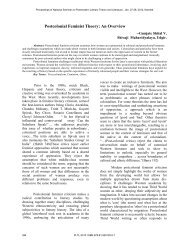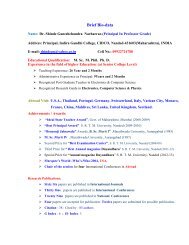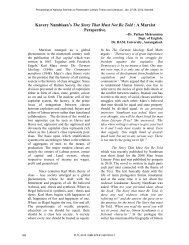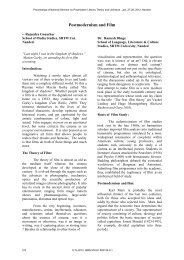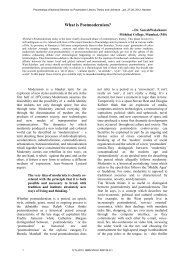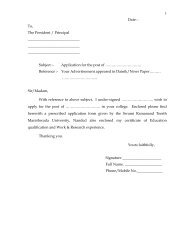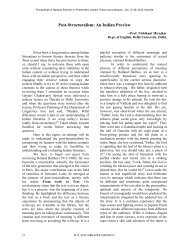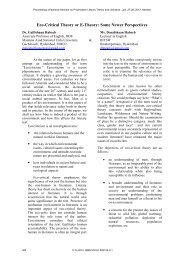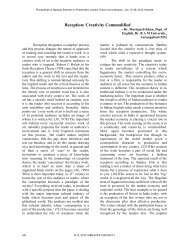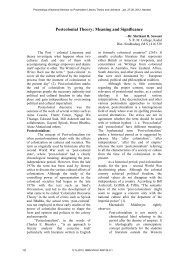Multiculturalism - Igcollege.org
Multiculturalism - Igcollege.org
Multiculturalism - Igcollege.org
You also want an ePaper? Increase the reach of your titles
YUMPU automatically turns print PDFs into web optimized ePapers that Google loves.
Proceedings of National Seminar on Postmodern Literary Theory and Literature , Jan. 27-28, 2012, Nandedprotagonist, asserts against male chauvinismfor her right to education and economicindependence.Virmati is a complex character to bestudied as her suffering raises someissues of modern women and theirproblems. She is torn between familyduty, desire for education an illicitlove with an professor and herneighbour who is already married andhas two children. She loves herparents, family, education and theromantic professor. She looks afterher ten siblings as their “secondmother.(Kapur:98)Kapur has studied the problems ofVirmati as a socialist / Marxist feminist for thesituation and struggle for identity and selfexpression.For her, it appears that feminism isboth a concept and a movement in the presentcentury and in a new dimension tocontemporary thinking. She reflects onVirmati’s conflicts (both internal and external)and depicts the protagonist in a favourablelight. On the one hand, she was aware ofprofessor’s love for her but on the other shewas not ready to betray her father’s faith inher. Even though Virmati was sure about theprofessor’s position and status, she haddecided to marry him as “he was… asuccessful academic, a writer of books, aconnoisseur of culture, a disseminator ofknowledge,” and above all she had an idea, “Iwould be lucky if I found a husband like myfather’’.(144)The major part of the novel deals withthe problems of Virmati as a difficult daughterfor her parents. At the beginning of her love,she knew that “professor Sahib wasn’tformidable” (40) but later she finds her life indifficulty standing between “education versusmarriage.” (38) She becomes rebellious for theprofessor’s reluctance to marry in spite of herfrequent entreating and this enables her tounderstand the gratification of ‘male desire.’Realizing her position in all artificial barriers,she complains to the professor :I am in the position of being yoursecret wife, full of shame, wonderingwhat people will say if they find out,not being able to live in peace, studyin peace and why? And why? BecauseI am an idiot.( 137)Kapur’s Virmati is a new Hinduwoman of postcolonial India and stands as ametaphor to explore the possibilities formodern women in education and economicindependence who experiences humiliationand disillusionment in their colonial matrix.The novelist has raised the ‘question ofwomen’ during a political and socialmovement in colonial India for which.We may term a novel ‘feminist’ for itsanalysis of gender as sociallyconstructed-for its understanding thatchange is possible and that narrativecan play a part in it. Feminist fiction isthe most revolutionary movement incontemporary fiction-revolutionaryboth in that it is formally innovativeand in the it helped to make a socialrevolution. 4Vimati’s quest for identity is a“spiritual odyssey of the modern man who haslost his social and spiritual moorings and whois anxious to seek his roots.” 23 In love makingand relationship, both the families suffer andwomen characters search for self-identity anddesire to assert their rights. Virmati’s strugglein the Darwinian theory for existence is onlyfor her love with the professor. Her love andmarriage with the professor has led him to anintellectual and scholastic perfection. IfProfessor’s marriage to Virmati is on hisintellectual selection, it appears quite Shavianin Kapur’s theory of man and superman butVirmati’s resentment with her family is quiteIbsenian like that of Nora’s in A Doll’s House.The novel evokes some concern overthe problems of women in a male-dominatedsociety where laws for women are made bymen in its social matrix and a husband standsas a ‘sheltering tree’ under which a womanproves her strength through her suffering.Kapur has defended this through her Virmatiwith an idea that“The emergence of feminist ideas andfeminist politics depends on theunderstanding that, in all societieswhich divide the sexes into differingcultural, economic or politicalspheres, women are less valued thanmen. Feminism also depends on thepremise that women can consciouslyand collectively change their socialplace.”(A. Rangacharya:140-1)For Professor Harish, Virmati is anenigma, a riddle and an essential partner forhis physical, emotional, intellectual andspiritual satisfaction. While professor’s lovewith Ganga is sacred and unsatisfactory, withVirmati it is platonic and based on intellectualunderstanding. The ‘winds of misfortune’ inboth the families blow for Virmati for which487 PLTL-2012: ISBN 978-81-920120-0-1



